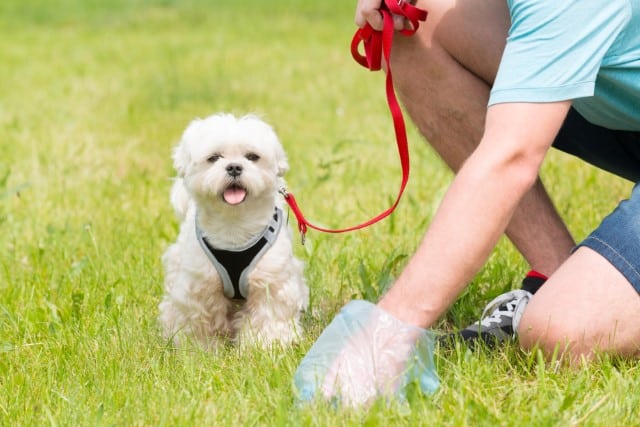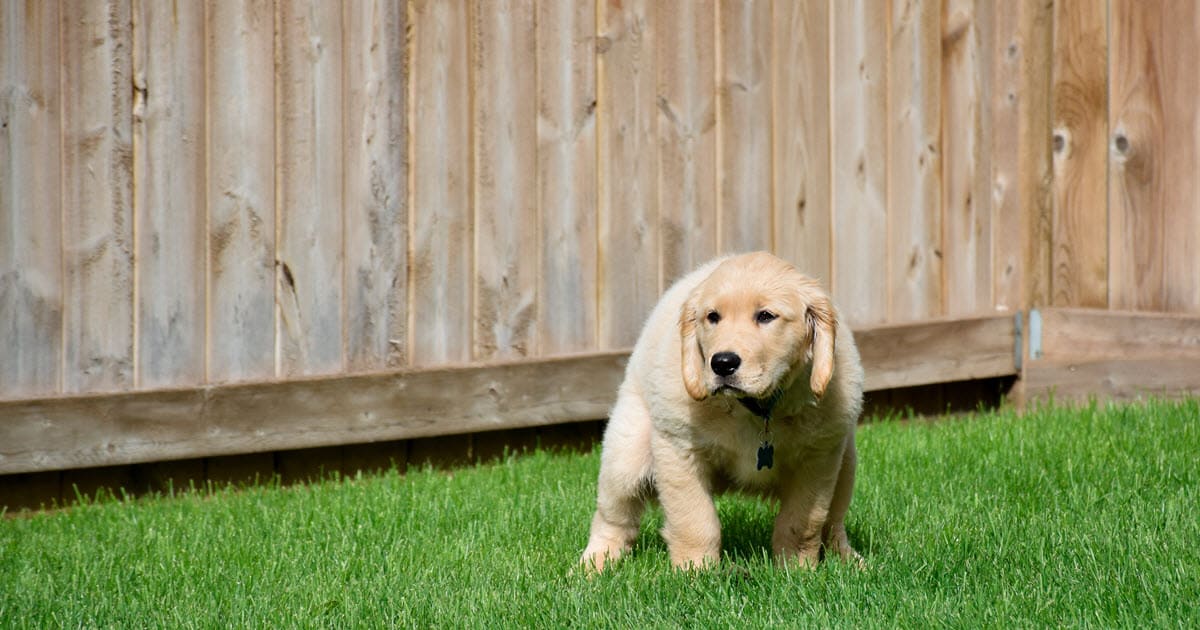A popular lawn care myth is that dog poop acts as a natural (and free) fertilizer for your lawn. But here’s the reality: dog poop isn’t good for grass, and in fact it can be harmful and even damage your lawn. Let’s find out more about this topic and the answer to your question: is dog poop good for grass?

This article was last updated on by Lawn Chick Owner Sarah Jameson
Article content reviewed for accuracy by Horticulturist Arthur Davidson, A.S.
Let’s be clear: No, dog poop isn’t good for your lawn. As I already touched on, it can actually hurt your grass.
According to this project by the N.H. Department of Environmental Services prepared by Catherine Coletti, Barbara McMillan and Sally Soule, “pet waste left anywhere is a potential public health risk.”
They explain that “just like human sewage, untreated pet fecal matter is harmful to waterways,”

Today, I’ll explain why dog poop is bad for your lawn. Also, I will reveal tips on how to grow a healthy lawn for dog owners, including how to prevent lawn damage from dog poop.
| LawnChick.com is reader supported. If you make a purchase after clicking a link, I may earn a commission at no additional cost to you. |
Is Dog Poop A Natural Fertilizer?
You shouldn’t think dog poop is a natural fertilizer for your lawn, though it might be natural to wonder about it since we’re familiar with the idea of using waste from farm animals in compost systems and in gardens.
But dog waste is different from cow manure for a few reasons (more on that in a moment).
First let’s dig into the nutrient content of dog waste (because, why not?).
Here’s the Scoop on the Nutrient Content of Doggie No. 2
On this episode of The Big Blue Rock Podcast from the University of Kentucky (a great listen if you have some time), UK Professor Brad Lee discussed the research he did surrounding dog waste and the potential eutrophication and impact it had.
Specifically he and his team tested 1,005 dog waste samples collected at local dog parks and found that on average dog poop contained about 4% Nitrogen and 3% Phosphorus.
“The EPA will tell you that a dog produces about 275 pounds of dog waste per year,” said Lee, joking that that number may be a bit on the heavy side and that perhaps they had collected that data from sled dogs in Alaska and not the pair of 35 pound dogs he has at home.
Still, based on that data, if you let your dog poop in your yard and don’t pick it up that’s two and a half pounds of phosphorus that you’re adding to the yard’s soil every year.

Where Did the Myth of Dog Poop Being Natural Fertilizer Come From?
So, how did people start thinking that dog poop could be a fertilizer? Well, it’s because they mistakenly thought that dog poop would act the same way as cow manure.
I also think that we’re keen to rationalize away the need to pick up poop … so maybe some of us are searching for a reason not to.
While cow manure does have some properties that make it a good natural fertilizer, the same cannot be said for dog poop.
One of the problems with dog poop is how much harmful bacteria it contains. If it’s left too long, it’ll turn toxic.
As a result, a plethora of bacteria will seep into your lawn (and potentially local waterways), harming your grass and preventing your lawn from being healthy.
While a certain amount of nitrogen (and potentially phosphorus) is important for your lawn, too much of a good thing just ends up running off into local waterways and can result in negative impacts that do significant damages.
One quick note on the use of lawn fertilizer containing phosphorus – some states and communities have passed legislation which bans or limits the use of phosphorus fertilizer due to eutrophication of ponds and streams. For example, in my state (Maine), you are allowed to use it when establishing a new lawn or re-seeding/overseeding an existing lawn, or when a lab-based soil test indicates that phosphorus is needed, but are not allowed to use it outside of these circumstances. I recommend that you check for local restrictions and consider a phosphorus free lawn fertilizer like this one from Jonathan Green.
What Are Some Harmful Side Effects of Dog Poop?
There are many harmful side effects of leaving dog poop on your lawn for too long.
They range from dead grass to lawn fungus growing, and all of them need to be taken care of as soon as possible.
The most common side effect of dog poop on a lawn is grass dying. This occurs in three stages once the dog poop has been left alone for a few days.

During the first stage, the grass will have a darker shade of green than normal. This means that the dog poop has already begun to break down and get into the soil.
In the second stage, yellow spots will start to appear on your lawn. This occurs because the high amount of nitrogen in the dog poop is sucking all of the nutrients out of the soil, making your grass yellow and dry.
The final stage is brown grass, indicating that the grass is dead.
Fungus from Dog Waste
However, dog poop can also cause some significant damage to your lawn in the form of lawn fungus.
Excessive watering can make your lawn more susceptible to lawn funguses. These funguses are drawn to moist environments.
Coupled with a high amount of nitrogen, they can grow and spread across your lawn like wildfire.
There are multiple different types of lawn fungus, but most of them can effectively harm and even kill your lawn.
Health Risks
Finally, some harmful side effects of dog waste go beyond damaging your lawn. Dog poop can spread harmful diseases and parasites to humans if it’s ingested.
You don’t have to directly touch it, but even touching dirt that dog poop has seeped into can cause harmful parasites to spread.

And as I’ve mentioned – dog poop can also pollute water sources nearby. If rain manages to wash away dog poop (or the surplus phosphorus it contains), harmful nutrients and bacteria could run into the water supply of lakes, rivers, and other bodies of water.
These reasons make it incredibly important to keep your lawn clean of dog poop.
How To Have a Healthy Lawn With Dogs
Even though dog poop can be very harmful, that doesn’t mean we have to give up our furry friends.
You can have a lush and healthy lawn, even with dogs. It does take some effort, though.

Choose Grass That’s Good For Dogs
There are certain types of lawn grass that handle dog waste better than others. Fescues and perennial ryegrass types are the most resistant, specifically the following five grass types.
Fescue
Fescue grasses effectively absorb moisture and grow well in shady areas
Kentucky Bluegrass
Kentucky Bluegrass has a rapid re-growth rate and is able to recover quickly.
Zoysia
Zoysia grass is very hardy, but it does take a few growing seasons to develop strong roots.
Perennial Ryegrass
Perennial Ryegrass establishes roots and proliferates quickly, making it very resistant to damage
Bermuda
This grass does well in warm climates and doesn’t require much irrigation
I recommend doing some research on which grass type is the best for your lawn based on where you live and how many dogs you have.
Designate a Specific Area In Your Yard
Training your dog to only do their business in a certain area of your yard can help limit how much your lawn gets damaged.

You can train them to go in a place that is out of sight, while the rest of your lawn remains healthy and lush.
You will still have to clean up after them, but knowing where your dog goes will help save time and energy.
Keep Your Lawn Watered
Water can help dilute the nitrogen that comes from your dog’s waste. When your dog poops, pick up the waste immediately and then water the area until the ground is damp.
Modify Your Pet’s Diet and Behavior
Encourage your dog to drink plenty of water. Staying well-hydrated is important not only for your dog’s health but also will help dilute the nitrogen level in their poop.

The more water your dog drinks, the more diluted the nitrogen in their poop will be.
How To Prevent Lawn Damage From Dog Poop
The best way to prevent lawn damage with dogs is to pick up dog poop immediately. This is an important rule no matter where your dog poops, whether it’s on your own lawn or somewhere else.
Picking up their waste immediately afterwards won’t give the dog poop a chance to seep into the soil and harm your lawn.

It will also prevent the dog poop from being washed away or accidentally ingested. This cuts down on the potential spread of harmful bacteria and parasites.
You can also dissolve any stray remnants of dog poop vinegar, agricultural lime, or enzyme based dissolving products.
If you are unable to scoop up your dog’s waste, you can use a poop vacuum or automatic scooper, then throw the poop bag away.
Once winter hits, it can be more difficult to consistently pick up your dog’s waste, especially if you live somewhere that gets heavy snow.
However, you shouldn’t let your lawn fill up with dog poop all winter.
Dog Poop is Bad for Your Lawn
While natural fertilizers can be good for lawns, dog poop does not fall under that category.
It can do much more harm than good to your lawn, and can even spread diseases and harmful bacteria.
As long as you keep your lawn clean and pick up your canine’s poop right away, there’s no reason you can’t have a furry friend (or two) and one of the best lawns on the block!











